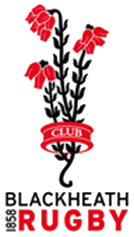
George FitzRoy Henry Somerset, 3rd Baron Raglan,, styled The Honourable George Somerset until 1884, was a British soldier and Conservative politician. He served as Under-Secretary of State for War from 1900 to 1902 and was Lieutenant Governor of the Isle of Man from 1902 to 1919.

Blackheath Football Club is a rugby union club based in Well Hall, Eltham, in south-east London.

Finchampstead is a village and civil parish in the Wokingham Borough in the shire of Berkshire, England. Its northern extremity is 2 miles (3 km) south of Wokingham, 5 miles (8 km) west of Bracknell, 8 miles (13 km) south-east of Reading, and 34 miles (55 km) west of Central London. It is an affluent area, with the village ranking as Britain's 31st wealthiest. It has a high standard of living and is rated as one of the most desirable places to live in the United Kingdom.
Liverpool St Helens Football Club is an English rugby union team formed from the merger of Liverpool Football Club and St. Helens RUFC.
Hugh Van Lynden Otter-Barry, was the son of Isabel Louisa née Wolryche-Whitmore (1847–1905) and Robert Melvil Barry Otter, later Otter-Barry (1845–1917), and great-grandson of William Otter, Bishop of Chichester. He was Bishop of Mauritius from 1931 to 1959.
The Gipsies Football Club was a short lived 19th century rugby football club that was notable for being one of the twenty-one founding members of the Rugby Football Union, as well as producing a number of international players in the sport's early international fixtures.

Lieutenant-General Sir John George des Reaux Swayne KCB CBE was a senior British Army officer who became General Officer Commanding-in-Chief (GOC-in-C) of South-Eastern Command during the Second World War.
Petley Price was a rugby union international who represented England on three occasions from 1877 to 1878.
Oliver Francis Huyshe MC was an English cricketer. Huyshe's batting style is not known, but it is known he fielded as a wicket-keeper. The son of the Reverend John Huyshe and Amy Niven, he was born at Wimborne Minster, Dorset where his father was the Vicar and was educated at King's School, Canterbury.
Frank Gibbs Rye was a British solicitor and Conservative politician.
Lieutenant Colonel Arthur John Barry (1859-1943) was an English civil engineer and architect of the late 19th and early 20th century.
Stamford Raffles-Flint was Archdeacon of Cornwall from 1916 until his death.
Most prime ministers of the United Kingdom have enjoyed the right to display coats of arms and to this day, prime ministers have their ancestral arms approved, or new armorial bearings granted, either by the College of Arms or the Lyon Court.
James Henry Hingston was Archdeacon of Cork from 1948 until 1954.
Sir Hugh Loveday Beazley was a County Court Judge (1934–1937), a Judge of the Mayor's and City of London Court (1937–1942) and the Common Serjeant of London (1942-1953).
George Heywood Hill was a British bookseller, and the founder of the Mayfair bookshop Heywood Hill in 1936.
William Oliver Jackson was an Anglican priest in Ireland during the second half of the 19th century and the first decade of the 20th.
Denis Heywood Peel was an English first-class cricketer.
Bertram Lennox Peel was an English first-class cricketer.
John Robert Chester Young was an English rugby union player who played in the Wing position. Young played club rugby for Harlequin F.C., was capped nine times for the England national team, and was a member of the British Lions team that toured in 1959, playing in one test match during the tour against New Zealand.




